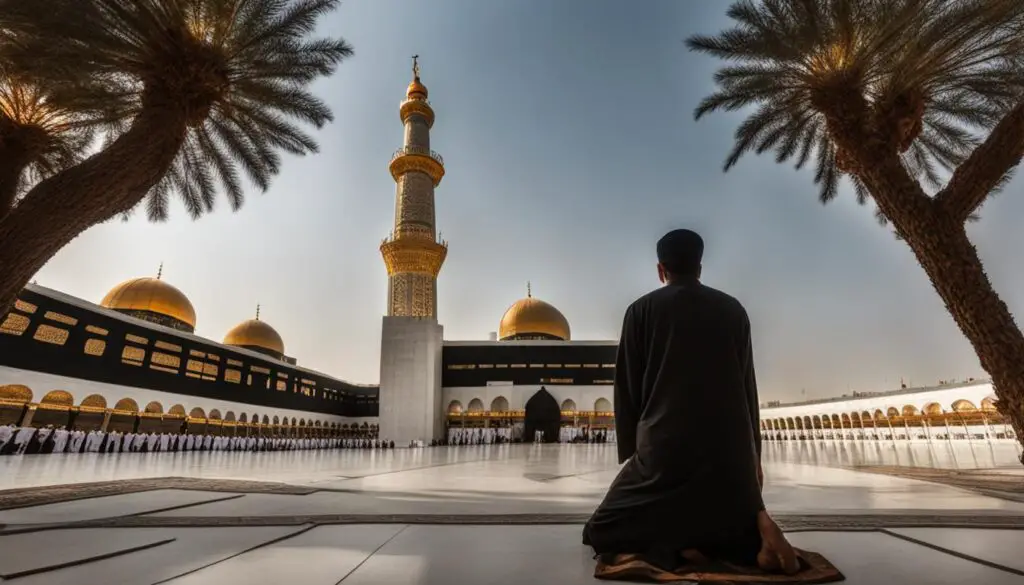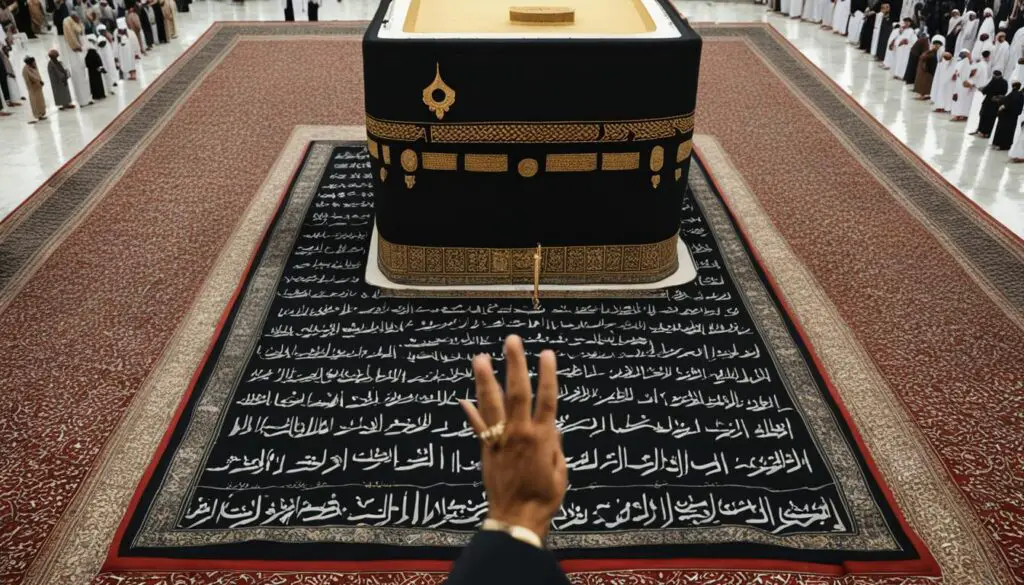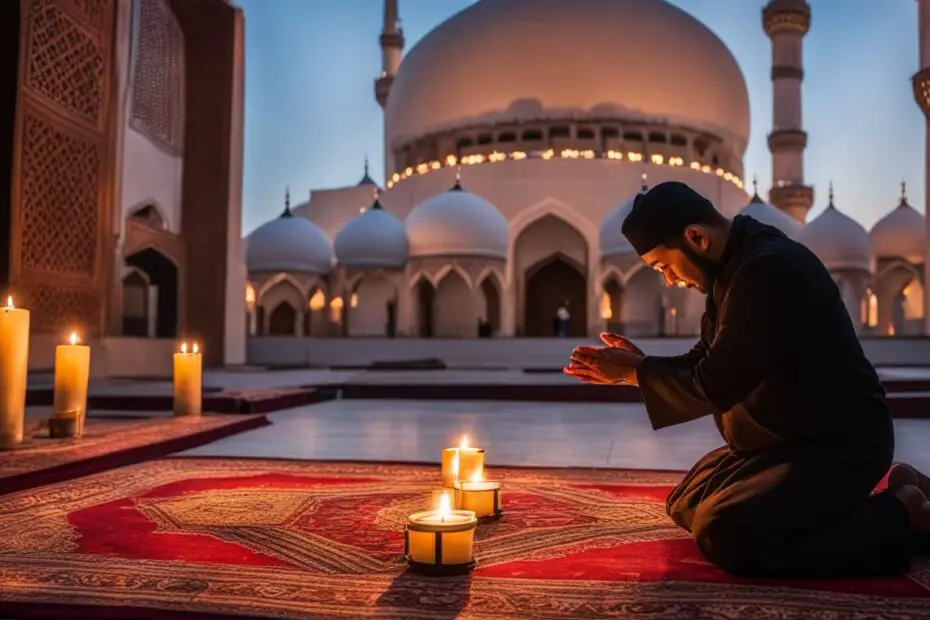Islam, the fastest-growing religion in the world, is attracting people from all walks of life who seek a deeper connection with the Divine. Embracing Islamic prayer traditions is a pathway toward finding serenity and establishing a profound bond with Allah. By understanding the prayer rituals in Islam and familiarizing ourselves with Islamic prayer times, we can embark on a spiritual journey that transcends physical acts of worship.
Key Takeaways
- Islamic prayer traditions offer a spiritual connection with Allah and bring peace and comfort to the believer.
- Prayer is considered one of the five pillars of Islam and holds deep cultural and spiritual significance in Islamic culture.
- Performing Islamic prayers requires specific steps, including purification, facing the Kaaba, reciting Quranic verses, and physical movements.
- Islamic prayer offers numerous benefits, such as stress reduction, improved focus, and increased self-discipline.
- The five daily prayers in Islam, known as Salah, are essential for maintaining a constant connection with Allah throughout the day.
The Importance of Prayer in Islam
In the Islamic faith, prayer holds tremendous importance and is considered one of the five pillars of the religion. It is viewed as a direct means of communication with Allah, allowing Muslims to seek guidance, forgiveness, and blessings. Prayer is not only a spiritual practice; it is also a way to demonstrate devotion to Allah and strengthen one’s faith.
“Verily, prayer is enjoined on the believers to be performed at appointed times.” — Quran 4:103
Islamic prayer goes beyond personal devotion; it has deep cultural and spiritual significance within Islamic culture. It fosters a sense of community and unity among believers, bringing people together in their worship and shared faith.
Throughout history, Muslims have recognized the importance of prayer in maintaining a strong connection with Allah. It is through prayer that believers can find solace, peace, and guidance in the face of life’s challenges.

Moreover, prayer offers an opportunity for self-reflection and self-improvement. It is a time for introspection, where Muslims can align themselves with the values and teachings of Islam, seeking to strengthen their moral character and develop a deeper understanding of their faith.
In summary, prayer occupies a central place in the Islamic faith, embodying the importance of seeking a connection with Allah and fostering spiritual growth. It serves as a reminder of one’s devotion, while also providing a sense of community and unity among Muslims worldwide.
Step-by-Step Guide to Performing Islamic Prayers
Performing Islamic prayers, also known as Salah or Salat, is an integral part of the Islamic faith. It is a means to connect with Allah, seek His guidance, and find inner peace and tranquility. To perform Islamic prayers correctly, one must follow a specific set of steps. Let’s dive into a step-by-step guide on how to perform Islamic prayers:
Purification (Wudu or Ghusl)
Before engaging in the prayer ritual, it is essential to cleanse oneself through Wudu (partial ablution) or Ghusl (full ablution) depending on the state of impurity. Wudu involves washing specific parts of the body, including the face, hands, arms, head, ears, and feet. Ghusl is performed when in a state of major impurity, such as after intimate relations or menstruation. These acts of purification symbolize the physical and spiritual readiness to communicate with Allah.
Facing the Kaaba in Mecca
During Islamic prayers, it is customary to face the Kaaba in Mecca, Saudi Arabia, which is considered the holiest site in Islam. The Kaaba serves as a focal point, symbolizing the unity and oneness of Allah and the Muslim community. By facing the Kaaba, Muslims direct their attention solely towards Allah, leaving behind worldly distractions.
Reciting Specific Verses from the Quran
As an essential part of Islamic prayers, recitation of specific verses from the Quran is encouraged. The recitation serves as a means of praising Allah, seeking His guidance, and drawing inspiration from His divine words. Muslims may recite various chapters (surahs) or specific verses during different prayer units (rak’ahs), expressing their devotion and gratitude towards Allah.
Performing Physical Movements
Islamic prayers involve physical movements that signify humility, surrender, and submission to Allah. These movements include standing (Qiyam), bowing (Rukoo), prostrating (Sujood), and sitting (Juloos). Each movement is performed with mindfulness and reverence, leaving the worshipper in a state of complete surrender to Allah’s will.
It is important to note that the number of prayer units (rak’ahs) and the order of movements may vary depending on the specific prayer time and the type of prayer being performed. It is advisable to seek guidance from knowledgeable individuals or consult reliable sources for accurate details on prayer requirements.
Performing Islamic prayers is an act of devotion and a way to strengthen one’s connection with Allah. It is a beautiful spiritual practice that brings solace, peace, and spiritual growth to Muslims worldwide.

Benefits of Islamic Prayer
Islamic prayer encompasses numerous benefits for both individuals and the community, fostering a deep spiritual connection with Allah and promoting personal and collective well-being.
1. Spiritual Connection: Islamic prayer serves as a pathway to connect with Allah, offering solace, peace, and comfort in times of need. It provides a direct line of communication, allowing individuals to seek guidance, forgiveness, and blessings.
2. Stress Reduction: Regular prayer has been shown to reduce stress levels, providing a moment of tranquility amidst the daily challenges of life. It allows individuals to pause, reflect, and find inner peace and serenity.
3. Improved Focus: Engaging in the ritual of Islamic prayer helps improve focus and concentration. By shifting one’s attention solely towards Allah, distractions are minimized, allowing for enhanced mindfulness and a clearer state of mind.
4. Self-Discipline: Islamic prayer instills self-discipline in individuals, as it requires adhering to a specific prayer schedule and performing the necessary physical movements with dedication and consistency. This discipline can extend to other aspects of life, promoting productivity and personal growth.
5. Gratitude and Humility: Prayer fosters a sense of gratitude towards Allah and all His blessings, encouraging individuals to express their thankfulness and acknowledge their dependence on Him. It also cultivates humility, recognizing that all achievements and successes are ultimately attributed to Allah.
6. Mindfulness: Engaging in Islamic prayer encourages individuals to be present in the moment and fully aware of their actions and intentions. It promotes a state of mindfulness, where individuals are conscious of their thoughts, emotions, and connection with Allah.
7. Unity and Social Bonds: Prayer in congregation strengthens the ties within the Muslim community, promoting unity, social interaction, and mutual support. It creates a sense of belonging and fosters a collective spirit among believers.
“Prayer is not asking. It is a longing of the soul. It is daily admission of one’s weakness. It is better in prayer to have a heart without words than words without a heart.” – Mahatma Gandhi
By embracing Islamic prayer traditions, individuals can experience these benefits and deepen their connection with Allah, finding solace, peace, and personal growth through this sacred practice.
| Benefits of Islamic Prayer |
|---|
| Spiritual Connection with Allah |
| Reduces Stress |
| Improves Focus and Concentration |
| Enhances Self-Discipline |
| Cultivates Gratitude and Humility |
| Promotes Mindfulness |
| Strengthens Social Bonds and Unity |
Understanding the Five Daily Prayers in Islam
The five daily prayers, known as Salah, are an integral part of the Islamic faith. These prayers hold immense significance and serve as a means for Muslims to establish a deep connection with Allah throughout the day. By understanding the practices of prayer in the Islamic faith, believers can embark on a spiritual journey that fosters devotion, mindfulness, and guidance.
Fajr (Dawn)
The Fajr prayer is performed before sunrise, marking the beginning of the day. It consists of two units (rak’ahs) and serves as a beautiful way to start the day by seeking Allah’s blessings and guidance.
Dhuhr (Midday)
The Dhuhr prayer takes place after the sun reaches its zenith. It involves four units (rak’ahs) and serves as a break in the middle of the day, allowing Muslims to pause, reflect, and reconnect with Allah amidst their daily activities.
Asr (Afternoon)
The Asr prayer is observed in the afternoon, typically between midday and sunset. It consists of four units (rak’ahs) and serves as a reminder to seek Allah’s refuge and guidance as the day progresses.
Maghrib (Evening)
The Maghrib prayer is performed immediately after sunset. It consists of three units (rak’ahs) and marks the end of the day. This prayer is a time of gratitude and reflection, as Muslims express their thankfulness for the blessings received throughout the day.
Isha (Night)
The Isha prayer takes place at night, after the twilight has disappeared. It consists of four units (rak’ahs) and serves as a moment to seek forgiveness, solace, and spiritual rejuvenation before retiring to sleep.
Performing these five daily prayers not only strengthens the bond between the individual and Allah but also cultivates a sense of discipline, mindfulness, and spirituality. It is through these prayers that Muslims find solace, seek guidance, and experience the beauty of their faith.
| Prayer | Time | Number of Units (Rak’ahs) |
|---|---|---|
| Fajr (Dawn) | Before sunrise | 2 |
| Dhuhr (Midday) | After midday until before sunset | 4 |
| Asr (Afternoon) | Afternoon until before sunset | 4 |
| Maghrib (Evening) | Immediately after sunset | 3 |
| Isha (Night) | After twilight has disappeared | 4 |

Exploring Islamic Prayer Times
Islamic prayer times are an essential aspect of practicing the Islamic faith. These prayer times vary depending on the geographical location and time of year. They follow a precise calculation based on the position of the sun. By being aware of the Islamic prayer times, Muslims can ensure that they perform their prayers at the appropriate times and fulfill their religious obligations.
To determine the Islamic prayer times, individuals can refer to Islamic prayer time tables or use mobile applications specifically designed for this purpose. These resources provide accurate and up-to-date information on the time for each prayer throughout the day. They take into account the specific calculations needed for different locations and seasons.
Typical Islamic Prayer Times
| Prayer | Time |
|---|---|
| Fajr | Before sunrise |
| Dhuhr | Midday |
| Asr | Afternoon |
| Maghrib | After sunset |
| Isha | After twilight |
It is important for Muslims to adhere to these prayer times to ensure that they establish a strong connection with Allah and benefit fully from the spiritual experience of prayer. By following the designated times, individuals can create a meaningful routine that nurtures their faith and fosters a sense of discipline and devotion.
Deepening Your Prayer Experience
To deepen your prayer experience in Islam, it is important to approach prayer with sincerity, focus, and humility. By incorporating specific practices into your routine, you can enhance your spiritual connection and elevate your prayer experience.
Recite Quranic Verses with Understanding
“And when you recite the Quran, We put between you and those who do not believe in the Hereafter a hidden barrier.”
When reciting Quranic verses during prayer, take the time to understand and reflect upon their meanings. This intellectual engagement can deepen your connection with Allah and cultivate a sense of reverence and awe.
Establish a Consistent Prayer Routine
“Indeed, prayer has been decreed upon the believers a decree of specified times.”
Consistency is key to deepening your prayer experience. Establishing a regular prayer routine helps foster discipline and strengthens the bond between you and Allah. Find a schedule that works for you, incorporating the five daily prayers at their designated times.
Seek Knowledge and Guidance
“Seek knowledge from the cradle to the grave.”
Expand your understanding of Islamic prayer by seeking knowledge from knowledgeable scholars and experts in the field. Delve into books, attend religious lectures, and engage in discussions to deepen your understanding of the rituals, significance, and benefits of prayer.
Create a Sacred Space
“Indeed, the first House [of worship] established for mankind was that at Makkah – blessed and a guidance for the worlds.”
Designate a space in your home where you can perform your prayers in tranquility. Create an atmosphere that is clean, inviting, and free from distractions. This space can serve as a reminder of the sacred act of prayer and help you focus and connect with Allah.
“The Prophet Muhammad (peace be upon him) said, ‘When anyone of you stands for prayer, he is communicating with his Lord, so let him pay attention to how he speaks to Him.'”
By implementing these practices into your prayer routine, you can deepen your connection with Allah and experience a heightened sense of spirituality. Approach each prayer with sincerity, focus on understanding the words you recite, and seek guidance and knowledge to enhance your overall prayer experience.
Embracing Prayer Traditions in Islamic Faith
Embracing prayer traditions in Islamic faith goes beyond the physical acts of prayer. It involves understanding the spiritual significance behind each action, reciting Quranic verses with reverence, and incorporating the teachings of Islam into daily life. Prayer should be seen as a continuous journey of self-improvement, connection with Allah, and devotion to the Islamic faith.
When performing Islamic prayers, it is important to approach each prayer with mindfulness and sincerity. Understand that prayer is not just a series of physical movements, but a means of connecting with Allah and seeking His blessings and guidance. By embracing the prayer traditions of Islam, you can deepen your spiritual journey and strengthen your relationship with Allah.
“Prayer is the key to Paradise; its practice (correctly) is the foundation of religion.” – Prophet Muhammad (peace be upon him)
Incorporating the teachings of Islam into your daily life is another important aspect of embracing prayer traditions. By striving to live according to the principles and values of Islam, you can ensure that your prayers are not isolated acts but an integral part of your overall dedication to the faith. This includes practicing honesty, kindness, gratitude, and compassion towards others.
Reciting Quranic verses during prayers not only helps to fulfill the required recitations but also deepens the spiritual connection with Allah. Take the time to understand the meaning behind the verses you recite, contemplate their messages, and apply them in your daily life. This will enhance the impact of your prayers and reinforce the teachings of Islam in your heart.
Acknowledging the spiritual significance of prayer and incorporating it into your daily routine is a powerful way to embrace prayer traditions in Islamic faith. Develop a consistent prayer routine, not only during obligatory prayer times but also by incorporating voluntary prayers such as the Sunnah and Nafl prayers. By doing so, you can enrich your prayer experience and maintain a constant connection with Allah throughout the day.
The Islamic faith emphasizes the importance of community and unity. Praying in congregation whenever possible fosters a sense of belonging, shared spirituality, and strengthens the bonds between Muslims. Embrace this tradition by joining your local mosque for congregational prayers, especially on Fridays for the Jumu’ah prayer.
| Benefits of Embracing Prayer Traditions in Islamic Faith | |
|---|---|
| 1. Spiritual Growth: | Deepens your connection with Allah, fostering inner peace and tranquility. |
| 2. Moral Development: | Encourages the practice of virtues such as humility, gratitude, patience, and compassion. |
| 3. Community Engagement: | Strengthens the bonds between Muslims and promotes a sense of belonging. |
| 4. Guidance and Protection: | Seeking Allah’s guidance and protection in all aspects of life. |
| 5. Personal Transformation: | Helps in self-reflection, self-discipline, and continuous self-improvement. |
In conclusion, embracing prayer traditions in Islamic faith is more than just performing the physical acts of prayer. It involves understanding the spiritual significance, incorporating the teachings of Islam into daily life, and maintaining a constant connection with Allah. By embracing these traditions, you can deepen your spiritual journey, foster personal growth, and strengthen your bond with the Islamic faith.
Conclusion
Embracing Islamic prayer traditions is a journey that offers a profound spiritual experience, allowing individuals to find serenity and connect deeply with Allah. Prayer holds immense significance in Islam, serving as a means of communication with the divine and a way to seek guidance, forgiveness, and blessings. Through understanding the steps, significance, and timings of Islamic prayers, one can embark on a path toward a more profound prayer experience.
By engaging in the time-honored rituals of Islamic prayer, individuals can cultivate a sense of peace, solace, and comfort in their daily lives. The act of prayer not only strengthens one’s faith but also brings numerous benefits to the individual and the community. Regular prayer can help reduce stress, enhance focus, foster self-discipline, and promote gratitude, humility, and mindfulness. Moreover, prayer in congregation fosters unity and strengthens social bonds among Muslims, reinforcing the sense of community within the Islamic faith.
To deepen the prayer experience, it is essential to approach prayer with sincerity, focus, and humility. Reflecting upon the meanings of the Quranic verses recited during prayer can help enhance the spiritual connection with Allah. By establishing a consistent prayer routine and seeking knowledge from scholars, individuals can further enrich their understanding of the prayers and the Islamic faith. Embracing prayer traditions in Islam is not only about the physical acts of prayer but also about integrating the teachings of Islam into daily life, making it a continuous journey of self-improvement, devotion, and connection with Allah.
FAQ
What are Islamic prayer traditions?
Islamic prayer traditions are time-honored rituals practiced by Muslims to connect with Allah and find serenity. They involve specific steps, recitation of Quranic verses, and physical movements.
Why is prayer important in Islam?
Prayer is considered one of the five pillars of Islam and holds great significance. It is a direct means of communication with Allah, a way to seek forgiveness, guidance, and blessings.
How do I perform Islamic prayers?
To perform Islamic prayers, you need to purify yourself (Wudu or Ghusl), face the Kaaba in Mecca, recite specific verses, and perform physical movements like standing, bowing, and prostrating.
What are the benefits of Islamic prayer?
Islamic prayer offers spiritual connection with Allah and brings solace, peace, and comfort. It reduces stress, improves focus, enhances self-discipline, fosters gratitude and mindfulness, and strengthens social bonds.
What are the five daily prayers in Islam?
The five daily prayers, known as Salah, are Fajr (dawn), Dhuhr (midday), Asr (afternoon), Maghrib (evening), and Isha (night). Muslims are encouraged to perform these prayers to maintain a constant connection with Allah.
How can I determine Islamic prayer times?
Islamic prayer times vary based on location and can be determined using Islamic prayer time tables or mobile applications. They are determined by the position of the sun and help Muslims fulfill their religious obligations.
How can I deepen my prayer experience in Islam?
To deepen your prayer experience, approach prayer with sincerity, focus, and humility. Recite Quranic verses with understanding, establish a consistent prayer routine, seek knowledge, and guidance from knowledgeable scholars.
What does it mean to embrace prayer traditions in Islamic faith?
Embracing prayer traditions in Islamic faith involves understanding the spiritual significance of each action, reciting Quranic verses with reverence, and incorporating Islamic teachings into daily life as a continuous journey of self-improvement and devotion.









